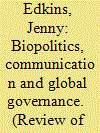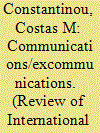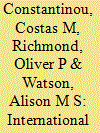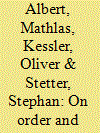|
|
|
Sort Order |
|
|
|
Items / Page
|
|
|
|
|
|
|
| Srl | Item |
| 1 |
ID:
081210


|
|
|
|
|
| Publication |
2008.
|
| Summary/Abstract |
In the aftermath of the 7th July 2005 bombings in London, communication with those searching desperately for relatives and friends was one-way or non-existent. The authorities dealing with the processes of the identification of the bodies of those killed or the treatment of those injured adopted procedures and protocols derived from emergency or disaster planning that were framed in terms of an instrumentalisation or objectification of persons. This article traces how these procedures reflect biopolitical forms of global governance that involve the production of life as 'bare life' and details how inappropriate and brutal these forms of governance seemed both to those searching for the missing and to the London Assembly 7th July Review Committee. It concludes that attention needs to be paid to the proliferation of such forms of politics as administration and the objectification they entail before we reach a stage where all life becomes nothing more than bare life, life with no political voice as such.
|
|
|
|
|
|
|
|
|
|
|
|
|
|
|
|
| 2 |
ID:
081207


|
|
|
|
|
| Publication |
2008.
|
| Summary/Abstract |
This interview was conducted over the Internet between February and April 2006. Armand Mattelart is Emeritus Professor of Information and Communication Sciences at the University of Paris VIII. From 1962 to 1973 he was Professor of Sociology of Population and Communication at the Catholic University of Chile, Santiago, and United Nations expert in social development. During the Popular Unity period (1970-73), he worked with the Government of President Salvador Allende until the military coup of September 1973, when he was expelled from Chile. Between 1975 and 1982, he taught at the University of Paris VII and Paris VIII, and, between 1983 and 1997, as founding member of the Communications Department at the University of Rennes 2 (Haute-Bretagne). He has carried out numerous research and teaching missions in Africa, Asia, Europe and Latin America. His research interests include communication theory and history, media studies and international communication. He has authored and co-authored numerous books, translated into many languages, including: Advertising International: The Privatization of Public Space (1991); Mapping World Communication: War, Progress, Culture (1994), The Invention of Communication (1996), Networking the World 1794-2000 (2000), The Information Society: An Introduction (2003), and, with Michèle Mattelart, Rethinking Media Theory: Signposts and New Directions (1992); The Carnival of Images: Brazilian Television Fiction (1990) and Theories of Communication: A Short Introduction (1998). His most recent book, published in French, is: La Globalisation de la Surveillance: Aux Origines de l'Ordre Sécuritaire (September 2007
|
|
|
|
|
|
|
|
|
|
|
|
|
|
|
|
| 3 |
ID:
081206


|
|
|
|
|
| Publication |
2008.
|
| Summary/Abstract |
We live in an interconnected, hyper-mediated world. A plethora of communications surrounds our everyday lives and polities, whilst new media and technologies have brought forth possibilities for, and ways of, communicating across space and time. Long-distance communication and travelling, the accelerated flow of information, ideas, images and sounds across national and other frontiers, the construction of multinational urban centres and global media corporations, the live broadcasting and commercialisation of major events and crises, the expansion of global advertising, spin and political marketing, and the advent of the Internet, have modified and complicated the reality of national, international and transnational relationships. This very collection of essays was made possible via the Internet to connect the Editors, based in different locations and while they were travelling. This is now the norm. Slightly more unusually, yet underlining the growing potential of this area, a workshop held at the University of St Andrews in November 2006 brought some of the contributors together both physically and virtually through the medium of Skype. Physical presence has long not been necessary in order to communicate, influence, or indeed, coerce
|
|
|
|
|
|
|
|
|
|
|
|
|
|
|
|
| 4 |
ID:
081208


|
|
|
|
|
| Publication |
2008.
|
| Summary/Abstract |
This article begins from the observation that while communication is a widely used catch-phrase in current IR theorising, the very concept of 'communication' is still mainly treated in terms of simple sender-receiver models which do not sufficiently elaborate how the insights of the 'communicative turn' can be made fruitful for IR theorising. The argument is developed in three steps. First - particularly drawing on the work of Karl W. Deutsch - we identify those pockets in IR theory, namely conflict studies and theories of 'communicative action', in which 'communication' plays a considerable theoretical role. Second, it is claimed that placing 'communication' at the centre of any theory of IR requires taking full account of the theoretical consequences of the 'linguistic turn'. To develop this argument requires an examination of the often implicit notion of 'communication' in contemporary uses of speech act theory and symbolic interactionism in current IR theory. Such a move necessarily leads to the diagnosis that all social systems and orders of exchange, including international relations, are communicatively constituted. Finally, such a view enables a reconfiguration of the central problems of 'order' and 'conflict' in IR theory in an innovative fashion: while the problem of order can be restated not as the problem of establishing regularities and patterns but as a problem of disconnecting communications, the problem of conflict can be restated not as a problem of a disruption of communication but as a problem of continuing conflict communication.
|
|
|
|
|
|
|
|
|
|
|
|
|
|
|
|
| 5 |
ID:
081209


|
|
|
|
|
| Publication |
2008.
|
| Summary/Abstract |
Although analysis in IR and IPE has increasingly started to focus on non-state actors and the information society, the role of the legal architecture of the Internet has been relatively under-analysed in terms of the structural power around communication interfaces. In this article I suggest the work of Lewis Mumford offers a useful lens for thinking about the political economy of technological change in an information society. I set out the role of intellectual property rights as the legal form of the global information society, and suggest a major challenge to this legal form is the idea of 'openness', specifically in the realm of open-source and/or free software. I examine this issue in the realm of (so-called) informational development, where major proprietary players (predominantly Microsoft) have been confronted by an increasingly vibrant open-source alternative. The open-source and free-software movements can be analysed as an emerging example of a globalised 'double movement', seeking to re-embed the tools of informational development in a societal realm of information, establishing in Mumford's terms a 'democratic technics' as a reaction to the programme of information and knowledge commodification spurred by the TRIPs agreement.
|
|
|
|
|
|
|
|
|
|
|
|
|
|
|
|
|
|
|
|
|